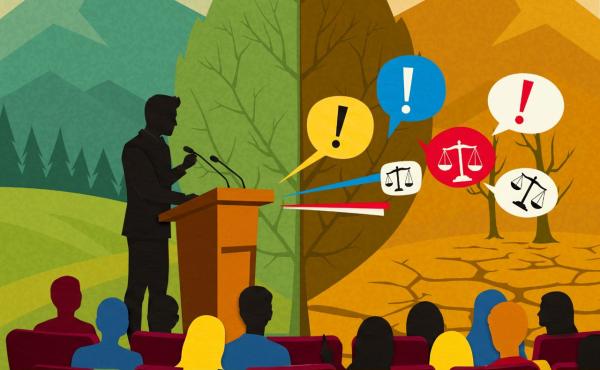
The ECGI blog is kindly supported by

Corporate greenwashing: The lawyers are coming
Greenwashing may be one of the greatest emerging legal risks across corporate sectors worldwide. Once a topic of relatively niche concern, the spectre of greenwashing liability continues to grow as more brands seek to portray themselves as climate-friendly and lawyers (and the broader public) get wise to the fact that not all that appears green is what it seems.
As with many things in life, prevention is the best cure, and while the future of greenwashing litigation is still unwritten, some hot issues are emerging. Here, I’ll explore some of them and offer some suggestions to avoid greenwashing.
To start, it may be helpful to review the basics. Generally, greenwashing is the practice of portraying a company, product, or activity as more environmentally friendly than it actually is. Legally, greenwashing claims often (though not always) fall under consumer protection laws, which typically prohibit commercial claims that have a tendency to mislead consumers. Often, these laws not only prohibit outright falsehoods, but also – and crucially – factually true statements that nonetheless have a tendency to mislead due to omitted context or overemphasis of one fact over another. These laws recognize that sometimes the best way to lie is to tell the truth – but only part of it.
Already, states in the US such as Massachusetts have filed consumer protection cases against fossil fuel producers for allegedly misleading consumers about global warming (a side effect of fossil fuel products) and the companies’ current climate credentials. On the other side of the pond, regulatory bodies such as the UK’s Advertising Standards Authority have fielded complaints about allegedly misleading climate-themed advertising across a variety of sectors, including banking. And movements within the public relations and advertising professions are calling for reform to expose and prevent greenwashing within their industries.
As legal interventions to address greenwashing expand, some of the key topics and issues we might see addressed include:
- Carbon capture. Companies like ExxonMobil frequently advertise their carbon capture activities in terms that may be appear impressive to consumers, but actual carbon capture capabilities are often negligible, and the high and potentially irreducible cost of the process may doom it to non-viability within for-profit contexts. Additionally, of the relatively small amount of carbon that is captured (and heavily advertised), a significant fraction is a) used to stimulate further fossil fuel production (increasing emissions) and/or b) captured during the natural gas refining process (leaving emissions from fossil fuel use unchanged). During a partial takeover of ExxonMobil’s board in 2021, for example, insurgent investor Engine No. 1 alleged the company’s “[m]inimal investment in more advanced carbon capture mostly produces advertising” and that its “[l]atest advertising blitz regarding a theoretical and unfunded carbon capture project lacks any real substance.” Strong words, and as more fossil fuel companies promote carbon capture as their route to sustainability (while renewables fall in cost), we may see the technology challenged on grounds that it’s not actually happening and may not be foreseeably viable.
- Carbon offsets. Similar to carbon capture, carbon offsets – paying to plant or protect a forest, for example – have been advertised as a way for fossil-fuel-reliant industries to achieve carbon neutrality. And today, consumers are regularly offered “carbon neutral” airline flights and more, all based on offset accounting. Behind the curtain, however, lurk problematic details. A recent investigation, for example, found that over 90% of the rainforest offsets approved by the world’s largest offset certifier were exaggerated or meaningless. And more fundamentally, carbon absorbed by trees is often re-emitted into the atmosphere over decades or sooner – meaning carbon offsets don’t really “offset” the burning of fossil fuels (which moves carbon from the earth’s crust to the atmosphere, forests, and oceans for thousands of years). As the offset market explodes, legal action might too.
- Net zero. A large fraction of the world’s biggest companies have pledged to emit net zero greenhouse gas pollution by 2050 or some other future point (and advertise those pledges to consumers). But the “net” in net zero has little meaning without negative emissions, which generally come in two forms: carbon capture and carbon offsets. If carbon capture and carbon offsets are not viable solutions to global warming, then where does that leave advertisements of net zero pledges (not to mention the broader net zero concept)? As net zero continues its march as the dominant paradigm for proving good corporate climate citizenship, legal interventions might seek to force companies to prove their pledges with hard numbers, investments, and business plans.
- Natural gas. Moving on to products that may be the basis of greenwashing actions, natural gas continues to be promoted to policymakers and advertised to consumers as a solution to global warming. When both methane and carbon dioxide emissions are accounted for, however, natural gas causes essentially as much global warming as other fossil fuels. Adding fuel to the fire, new research has revealed just how bad natural gas is for human health. Advertisements promoting gas often use (possibly) narrowly true but potentially misleading terms such as “cleaner-burning” and “lower-carbon.” Even if gas isn’t the deadliest poison, though, it’s still harmful, and courts might find such promotions misleading.
- Hydrogen fuel. Long a favorite of oil and gas companies, hydrogen’s secret is that it is almost entirely produced from natural gas, meaning – at least at present and for the foreseeable future – it’s a fossil fuel in disguise. This fact makes advertisements promoting “zero-emissions” hydrogen flat-out false.
- Biofuels. For years and until recently, ExxonMobil loudly told the public it was creating zero-emissions biofuels from algae. The problem: it wasn’t (and as of this year, the project is officially closed). Perhaps the harshest assessment came from insurgent investor Engine No. 1 in 2021, which while capturing seats on the company’s board told shareholders that “[a] decade of promoting algae biofuels despite lack of viability shows a similar focus [to carbon capture] on advertising over reality … ExxonMobil has touted algae biofuels for more than a decade, yet has little to demonstrate for it other than advertising … Its most recent goal of producing 10,000 barrels by 2025 is ~0.02% of ExxonMobil’s refining capacity.” Other problems with biofuel advertisements include omitting cost viability, scalability, and the fact that biofuels typically still contain fossil fuel.
- Green branding. Some advertisements don’t focus on a particular product but rather portray the overall brand as climate-friendly (e.g., BP’s Beyond Petroleum campaign, Shell’s Make the Future campaign, and Chevron’s We Agree campaign). Inspiring music plays over images of solar panels, wind turbines, and electric vehicles, suggesting to consumers the presence of a truly diversified energy company. The problem is that the hard numbers show many of these companies are far from diversified and retain a near-total business focus on fossil fuels. Carbon majors and others may continue to pledge that they will invest heavily in non-fossil energy sources in the future, but courts might decide non-binding promises are not good enough.
If the above is any indication, greenwashing claims might keep lawyers busy for a very long time. Beyond the legal risk, however, there’s the human risk: fundamentally, greenwashing is harmful because it wastes time and misdirects attention.
So how to avoid greenwashing and be part of the solution? Three suggestions:
- Recognize that negative emissions might not be viable, at least in a business context. In 1981, Exxon internally considered carbon capture as a solution to prevent global warming but concluded the process would be too expensive compared to renewables. Not only does this illustrate how carbon capture has had plenty of time to mature (with remarkably limited success), but it also points to the cost dilemma facing the technology: to be market competitive, carbon capture doesn’t just need to be cheaper than some hypothetical carbon price, it needs to be cheaper than renewables (e.g., battery-backed solar), which continue to rapidly fall in cost. Perhaps future governments will spread the cost of cleaning up the atmosphere, but that scenario isn’t relevant to corporate carbon capture advertisements today.
- Recognize that in practice, net zero likely means replacing fossil fuels. Global warming is primarily a side effect of fossil fuel use, and the lack of foreseeably viable negative emissions processes means controlling global warming requires controlling (and replacing) fossil fuels. The good news is that renewables have rapidly fallen in cost due to economies of scale and mass production. And decarbonizing corporate supply chains by building or purchasing renewable power will accelerate further cost reductions and the necessary energy transition.
- Recognize that making true green claims is not hard, and consumers reward companies doing the right thing on one of this generation’s defining challenges. Most companies don’t have an existential conflict with decarbonization – meaning they can replace fossil fuels within their product and supply chains, advertise that fact loudly, and reap the rewards.
Attention on greenwashing is overdue and bound to increase – and that’s ultimately a good thing, because when it comes to climate change, we can’t afford to waste more time on false solutions and half-truths. Companies that lead the way in developing true green branding – backed by meaningful action – may see rewards, while those putting image over substance may face legal liability. One way or another, it’s an issue that isn’t going away anytime soon.
---------------
By Dr. Benjamin Franta, a Senior Research Fellow in Climate Litigation at the University of Oxford Sustainable Law Programme
If you would like to read further articles in the 'Governance and Climate Change' series, click here
The ECGI does not, consistent with its constitutional purpose, have a view or opinion. If you wish to respond to this article, you can submit a blog article or 'letter to the editor' by clicking here.



